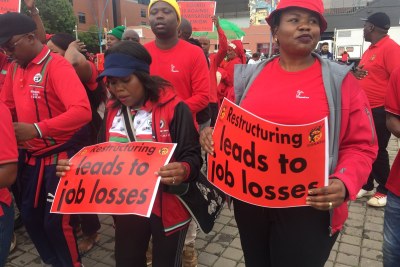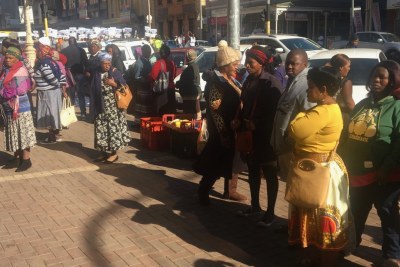-
South Africa: Steel Workers Countrywide Down Tools, Demanding 8 Percent Wage Hike
GroundUp, 5 October 2021
Thousands of workers affiliated to the National Union of Metalworkers of South Africa went on strike across the country on Tuesday. Read more »
-
South Africa: Numsa's Indefinite Strike Will Bring South Africa's Beleaguered Steel Industry to Its Knees
Daily Maverick, 5 October 2021
Workers in the steel and engineering sectors have embarked on an indefinite strike over a long-standing dispute on salary increases in 2021. The strike might be like the one in… Read more »
South African Metal Workers Down Tools In Steely Wage Hike Demand
Thousands of workers affiliated to the National Union of Metalworkers of South Africa (NUMSA) have gone on an indefinite strike across the country. The strike, which involved some of NUMSA's 432,000 workers, resembles one in 2014 that lasted for four weeks and cost the steel and engineering sector between U.S.$20.8 million and U.S.$36.6 million per day, or U.S.$396 million for the broader economy, writes Ray Mahlaka for Daily Maverick.
News of the strike sent the share price of ArcelorMittal SA, one of the country's big steelmakers, nearly 1% lower, wiping off U.S.$4.7 million from its value on the Johannesburg Stock Exchange. The steel and engineering industry is an important component of SA's economy: it represents nearly 2% of the country's economic output and is responsible for 190,000 direct jobs.
Phakamile Hlubi-Majola, NUMSA spokesperson, said the deadlock over negotiations is a slap in the face of workers who decided to forego a wage increase in 2020 and agreed to a standstill agreement, due to the Covid-19 pandemic. Employer associations have offered a three-year agreement with a 4.4% increase for the first year. This was rejected by the union representatives.
"We will not accept 4.4%. Even 8% is small but we can make it work. The money we make is not enough. The employers can take their children to university, we can't do that," a NUMSA member.
InFocus
-
As many as 50,000 workers will protest retrenchments in the banking sector in a nationwide strike that will see ATM and card transactions, as well as tax-related payments, ... Read more »
-
The Congress of South African Trade Unions (Cosatu), with its affiliates, embarked on a national strike on February 13, to protest against joblessness and retrenchments in the ... Read more »
-
South African social grant beneficiaries have been left to the mercy of striking Post Office employees as strike action barred them from accessing their payouts. Read more »

Hundreds of NUMSA workers marched from the Mary Fitzgerald Square to the Metals Engineering Industries Bargaining Council office in Marshalltown to hand over the memorandum of their demand on Tuesday. It was part of the national strike by steel engineering workers who are demanding an 8% wage increase, among other things.




